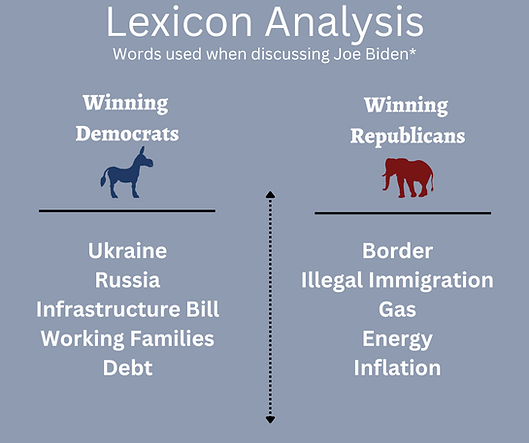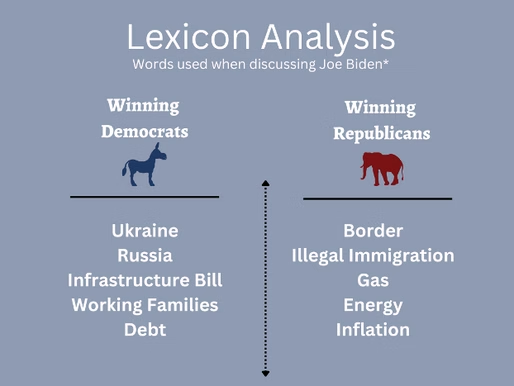It would seem impossible to guess who is going to win the midterm elections. However, examining the themes discussed online by candidates during the Senate primaries, we uncovered a few interesting insights on the messages put out by different campaigns and the ways in which they influence constituents perceptions, as well as their vote.
Key Points
-
On Twitter, Republican candidates tend to be more vocal than Democratic ones, tweeting 108% more frequently.*
-
Observed candidates mentioned Donald Trump in more than 8% of their total tweets, but frequently mentioning the former President did not appear to be a winning strategy for either political party; sentiment (positive, negative, or indifferent) towards President Trump did not matter in the post.
-
Candidates mentioned Joe Biden in 11% of their total tweets. Data suggests that criticizing the President may have worked in Republicans’ favor, while aligning with him may have been detrimental to Democrats.
Where We Stand: Post Primaries
As the country barrels toward the midterm elections in November, there remain a lot of questions about the campaign landscape as it currently stands. The polls have fluctuated, but most experts still predict that Republicans will gain control of the House, and by a more narrow margin, the Senate. Pollsters have been wrong before, and in today’s political climate, there’s no shortage of reasons to cast doubt on this year’s forecasts. We have a president with less than optimal approval ratings (45% according to the Washington Post), a former president who wields waning – but still outsized – political power, the most significant promised investment toward environmental protections in global history, and one of the biggest rollbacks of constitutional protections in national history. If you think you know exactly how November is going to play out, you’re probably going to be surprised.
In such uncertain times, it would seem a fool’s errand to try to predict the outcome of the midterm elections – but we’re too curious to not give it a try! Here at Ringer Sciences, when the world doesn’t seem to make much sense, we turn to behavioral metrics, analyzing social media data as a leading indicator of things that may impact real world behavior. In this case, we’re using Twitter to try and make sense of the Senate midterm primaries in the hopes of gaining a better understanding of which social factors seem to correlate most heavily with victory. In the coming weeks, we plan to publish two more pieces to see how these findings fare in November.
Methodology
For our initial cut of the data, we analyzed only those primary races where we saw the least amount of parity between opponents’ Twitter followerships. Our rationale was that if one candidate had 100,000 Twitter followers and the other had 100, it would make little difference what they spoke about online since their reach wasn’t comparable. This left us with 17 races* total – 7 Democrat, 10 Republican. To stay consistent, we pulled data from each race starting two months prior to election day and ending on election day. The caveat is, of course, that different issues may have taken center stage during each respective two-month period.
Analysis and Results
In general, we found Republican candidates to be far more vocal on Twitter than their Democratic counterparts – tweeting approximately 23% more frequently on a per-candidate basis. That being said, we found little-to-no relationship between tweet frequency and victory. In fact, only in about half the races (across both parties) did we find that the winning candidate tweeted more often than his or her opponent. This went against our general hypothesis that, audience size being similar, the more vocal candidate would have the edge.
Digging a bit deeper, we began to see some interesting insights when examining the thematic content pillars our candidates were discussing online. Unsurprisingly, we found that in only 14% of the Democratic races did voters select the candidate who more frequently discussed Joe Biden. Conversely, in 80% of the Republican primaries, voters chose the candidate who mentioned Biden more than his or her opponent. Though this was to be expected, these numbers illustrate the idea that criticizing Biden may represent a winning strategy for Republicans, while it may be more beneficial for Democrats to distance themselves from the current President.

*Biden terms include “the president,” “Biden,” “46th
president,” and “POTUS” among others
Things start getting a little less predictable when we examine how candidates discussed former President Donald Trump. We would’ve expected more success from those Democrats who leveled the most attacks against Trump and likewise those Republicans offering the most praise, but we would’ve been wrong. In fact, only 43% of successful Democrats leaned heavily on Trump criticisms, and conversely, only 50% of victorious Republicans campaigned most frequently using the former president’s name. This is perhaps a sign that number 45 will play slightly less of a role in this upcoming election than he has in elections past.
Beyond the realm of domestic issues, international affairs were only lightly touched upon by Democratic candidates; however, for Democratic voters, diplomacy and the idea of national sovereignty appear to have been of particular importance, as the winners of 71% of Democratic primaries spoke in higher volumes than their opponents about Russia’s war in Ukraine. In an election cycle where many believe democracy to be on the ballot, the messages from senate candidates eager to defend Ukraine against an unprovoked aggressor seem to have resonated with constituents. On the opposite side of the spectrum, Republican candidates discussed the situation in Ukraine quite a bit – primarily asserting that they have better solutions to the situation than the current administration, or that we need to focus more on domestic issues – but this didn’t seem to sway voters. Interestingly, it appears that only 10% of the time, those Republicans who won their primaries discussed Russia and Ukraine more than those who lost.
One of the most telling issues discussed by candidates was climate change and sustainability. On the right, Republican attacks on the Inflation Reduction Act, clean energy, and electric vehicles appear to have been well received by constituents, who, 80% of the time, made victorious the candidate who spoke most frequently on these matters. On the left, Democrats’ promises to support advancement in the climate space could be said to have fallen on deaf ears, as those who most frequently discussed related issues only saw victory 14% of the time.
Conclusion
Again, it would be impractical to claim that any of the above could be used to predict the outcome of the general election or even future primaries – there are an incalculable number of factors that go into a political victory – but we’re looking forward to November to see which, if any, of the trends outlined above continue to hold true.
We’ll be back the week of the elections, and in the days following, for more in-depth analyses. In the meantime, don’t forget to get out there and vote!
##
*Based on 17 senate primary races (10 Republican, 7 Democrat)
The analysis is based off 17 Senate races involving the following political candidates:
Democrats
-
Abby Finkenauer – Iowa
-
Michael Franken – Iowa
-
Trudy Busch Valentine – Missouri
-
Lucas Kunce – Missouri
-
Spencer Toder – Missouri
-
Cheri Beasley – North Carolina
-
Everette Newton – North Carolina
-
Morgan Harper – Ohio
-
Tim Ryan – Ohio
-
Madison Horn – Oklahoma
-
Jason Bollinger – Oklahoma
-
John Fetterman – Pennsylvania
-
Malcolm Kenyatta – Pennsylvania
-
Conor Lamb – Pennsylvania
-
Krystle Matthews – South Carolina
-
Catherine Fleming Bruce – South Carolina
Republicans
-
Blake Masters – Arizona
-
Mark Brnovich – Arizona
-
Michael McGuire – Arizona
-
John Boozman – Arkansas
-
Jake Bequette – Arkansas
-
Jan Morgan – Arkansas
-
Themis Klarides – Connecticut
-
Leora Levy – Connecticut
-
Eric Greitens – Missouri
-
Mark McCloskey – Missouri
-
Billy Long – Missouri
-
Eric Schmitt – Missouri
-
Sam Brown – Nevada
-
Adam Laxalt – Nevada
-
Bruce Fenton – New Hampshire
-
Don Bolduc – New Hampshire
-
Ted Budd – North Carolina
-
Pat McCrory – North Carolina
-
Mark Walker – North Carolina
-
J.D. Vance – Ohio
-
Josh Mandel – Ohio
-
Mark Pukita – Ohio
-
James Lankford – Oklahoma
-
Jackson Lahmeyer – Oklahoma
-
Kathy Barnette – Pennsylvania
-
Mehmet Oz – Pennsylvania
-
Carla Sands – Pennsylvania



